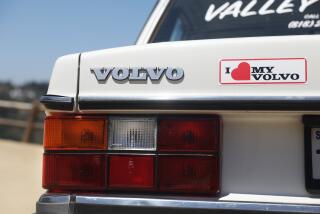Toyota Knows How to Drive a Feeling
- Share via
Most American owners of a Toyota couldn’t tell you anything about the company’s manufacturing philosophy. They wouldn’t have a clue about “just in time” supplier chains and wouldn’t know lean production from Lean Cuisine. But they know quality. And quality is a feeling.
I first felt it in my family’s 1972 Toyota Corona Mark II hardtop -- I can still remember the little green crystal mounted in the fender -- and last felt it when I drove a 2003 Lexus RX330 sport utility. (Lexus is the overwhelmingly popular luxury brand for Toyota’s high-end products sold in the United States).
In the intervening three decades, Toyota’s products have grown bigger, faster, more luxurious and vastly more expensive. But a certain quintessence remains. There is a heft and trustworthy weight to the controls and switches, a surety in the steering wheel, pedals and gearshift, a bell-like clarity to the cabin ambience.
Toyotas have what so many presidential candidates lack: gravitas.
What a long strange trip it has been for Toyota, from a maker of weaving machines to the second-largest car company on Earth. Much of the credit for the company’s rise should go to W. Edwards Deming, the American management consultant who, in addresses and lectures across Japan after World War II, framed Japan Inc.’s industrial constitution.
Deming -- whom the Japanese call the father of the third industrial revolution -- preached that the rigorous pursuit of quality was the key to increased productivity and profits, the exact opposite of Western management orthodoxies. Deming’s “profound knowledge” approach asked management to think about manufacturing as a dynamic system of enlightened humanism that could function only if it evolved toward greater efficiencies.
Deming was the world’s first industrial-strength philosopher.
While American manufacturers scoffed at such notions, the Japanese -- who had been deeply humbled by their wartime experience -- embraced them eagerly. In Toyota’s case, the result was a company that built superior products and sold them at astonishingly low prices.
I remember the first Lexus LS400 I drove in 1990. I couldn’t believe the way it felt. Really, no car I had ever driven could compare to its lush, dreamlike quiet, its silky ride, the frictionless hum of its powerful V8 engine. The car was swamped with classy surfaces, wood and leather, and the coolest instrument panel I had ever seen -- the glowing, electroluminescent needles jumped to attention in an inky void. The price of the car was about $39,000, much cheaper than a comparable BMW or Mercedes. I remember writing the phrase “cut-rate diamond” to describe my first Lexus.
Competitors grumbled that Toyota was price-dumping cars in the U.S. market -- which is to say they were taking a loss on the sale of vehicles to establish the Lexus brand. But with the distance of time it appears that wasn’t the case. It must have been cold comfort to Toyota’s competitors to realize it was actually making a profit on the LS400.
The same complaint has been voiced over the new Toyota Prius hybrid -- a car in its own way every bit as revolutionary as the LS400. The Prius’ advanced hybrid system coordinates power from an electric motor and a gasoline engine to propel the car and captures energy otherwise lost in braking to recharge the batteries.
Hybrid systems such as Toyota’s rely on exotic control software and expensive batteries, which have limited the technology in the past. But Toyota, in its typical stalking-horse way, has been refining the system for several years while its component costs have come down. The 2004 Prius, which sells for around $20,000, is a hit, offering real-world size and performance with astounding fuel economy of 50 miles per gallon or more in mixed driving. It was named car of the year at last month’s North American International Auto Show in Detroit, and in the Los Angeles area there are months-long waiting lists.
As for whether Toyota is losing money on the Prius, it’s impossible for outsiders to say. However, Toyota’s hybrid system will soon be available on its Highlander SUV and in a future model of the Lexus RX330. In other words, Toyota is about to market SUVs with a clear conscience as an available option.
So while American carmakers dither about the future glories of fuel cells and lobby and litigate against higher fuel-efficiency standards, Toyota is getting on with the business of making money on hybrid-powered vehicles.
With Toyota, diversity is structural and strategic. In the U.S., Toyota sells everything from the hippo-like Lexus LX470 to the ugly-as-cute Scion xB wagon, a Gen Y runabout.
Toyota will also join NASCAR’s Craftsman Truck racing circuit this year with its Tundra -- the first foreign nameplate to race in NASCAR’s big leagues. It is also the only manufacturer other than Ferrari to build its own chassis and engines for Formula One events.
As Toyota assumes the mantle of the world’s second-largest car company, it’s worth asking what is it that unites all these efforts? In a word: trust. Consumers continue to flock to Toyota because the company delivers what it promises, and it promises so much.
It’s more than a promise. It’s a feeling.
*
Dan Neil is The Times’ automotive critic.






